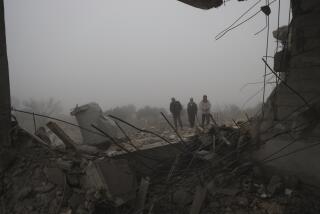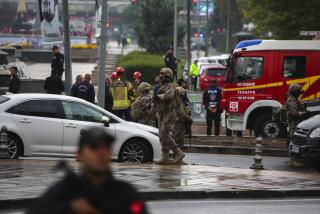More Than 90 People Die in Iraq Assaults
BAGHDAD — A suicide attack killed 60 people in the northern Kurdish city of Irbil and assaults in the capital claimed at least 31 more lives Wednesday and today, in the bloodiest 24-hour period in Iraq in more than two months.
U.S. and Iraqi officials said the Irbil attack was carried out by a bomber who blew himself up about 9 a.m. Wednesday in a crowd of job seekers outside a police recruitment center in the Kurdish provincial capital.
In a statement posted on a militant website, the radical group Ansar al Sunna claimed responsibility for the bombing. The building where the attack occurred also housed the local offices of the Kurdish Democratic Party. Ansar’s statement said the attack was revenge for Kurdish cooperation with U.S. forces.
Streets were streaked with blood as more than 150 wounded people were taken by taxi and ambulance to hospitals.
“It’s a slaughterhouse,” said Jwan Abdul Qader, a 30-year-old nurse at Irbil’s Rezgary Hospital as she and other staff members struggled to aid the wounded.
Overwhelmed by the number of casualties, the hospital called for blood donations. Mohammed Doyaa, a 25-year-old student, responded to the plea. “I can’t understand why they did this,” he said. “To gain what?”
Twelve hours after the Irbil attack, a car bomb exploded in Baghdad’s Doura neighborhood, killing at least nine people and wounding 16. The U.S. military said that as many as 15 people were killed.
At 6 a.m. today, men carrying rifles fired on two patrol cars on a bridge in the capital, killing six people and setting the cars ablaze, Iraqi officials said. Simultaneously at a different police checkpoint, gunmen killed two police officers and injured one.
At 7:15 a.m., an attacker blew himself up near the recruitment center at the closed Muthana airport, killing 13 Iraqi national guardsmen and injuring 15. A short while later, a car bomb exploded near the house of deputy interior minister of police affairs, Hikmat Musa Salman, killing one person and injuring six.
The attacks began on the day after the first elected Iraqi government in generations was sworn in amid offers of reconciliation to Sunni Arab insurgents from Shiite Prime Minister Ibrahim Jafari and speeches pledging ethnic and religious unity.
More than 200 people have been killed in insurgent attacks since the new Cabinet was announced a week ago.
Rosh Shawais, a deputy prime minister who is Kurdish, said the Irbil attack would only strengthen the relationship between the two main Kurdish parties, which control 75 of the 275 seats in the National Assembly.
Ansar al Sunna said the bombing had been carried out by car. The same group has also claimed responsibility for twin attacks in Irbil that killed more than 100 people in February 2004.
The violence Wednesday recalled those attacks, in which a pair of suicide bombers infiltrated holiday celebrations of the Kurdistan Democratic Party and the Patriotic Union of Kurdistan and blew themselves up in nearly simultaneous strikes. Several top members of the parties were killed.
The 2004 bombings stunned the parties’ leaders, who have been staunch U.S. allies since the early 1990s and strongly supported the invasion to oust Saddam Hussein.
Since the twin attacks, Irbil -- about 200 miles north of Baghdad -- had been relatively quiet.
Sangar Ahmad, 22, said he had been standing in line with his brother and other prospective recruits but couldn’t remember the explosion.
“I woke up here in the hospital,” said Ahmad. As for his brother, he said, “I do not know whether he is alive or dead.”
“This is a crime,” said Hogher Ghareeb, a 28-year-old lawyer. “But the will of the people is stronger than the terrorists.”
“This is horrible!” said 25-year-old Abdul Qader Kheder, a student who was at the scene. “The one who did this is not a human being.”
The estimates of casualties varied, with some Iraqi officials putting the death toll closer to 70. It was by far the deadliest single attack in the country since Feb. 28, when a car bomber drove into a crowd of Iraqi police and army recruits awaiting medical examinations in Hillah, killing about 125 people and wounding more than 140.
Militants frequently target recruits and security forces, who are seen as vital to the Iraq government’s plan to stabilize the country.
As of Monday, at least 616 Iraqi police had been killed this year, according to statistics compiled by the Brookings Institution in Washington.
At the swearing-in ceremony Tuesday, Jafari appealed for Iraq’s fractious religious and ethnic groups to unite.
“It is true that every minister belongs to a specific background and there are multiple loyalties for each minister according to religion, sect, nationality, specialty and region,” Jafari said. “But the ministries will have one aim: The government will be Iraqi and its doors will always be open to Iraqis.”
But the three top Sunni politicians, including Vice President Ghazi Ajil Yawer, boycotted the event, embarrassing the new government and reinforcing a belief here that the once powerful Sunni Arab minority that prospered under Hussein’s rule now feels marginalized.
The government has until mid-August to draft a constitution, and until December to prepare Iraq for parliamentary elections, but perhaps the greatest challenge will be integrating Sunni Arabs into the political process. Shiites, believed to make up about 60% of the population, have a small majority in the assembly.
Elsewhere Wednesday, the body of an Iraqi soldier who had been on leave was found in Baghdad’s Khadraq neighborhood.
U.S. officials also said Iraqi forces captured Hussein’s nephew Ayman Sabawi north of Tikrit this week, according to a statement released Wednesday. Sabawi has allegedly backed insurgent groups with money and weapons. Several others were also arrested during the raid.
*
Times correspondent Abdul Salam Medeni in Irbil contributed to this report.
More to Read
Sign up for Essential California
The most important California stories and recommendations in your inbox every morning.
You may occasionally receive promotional content from the Los Angeles Times.










